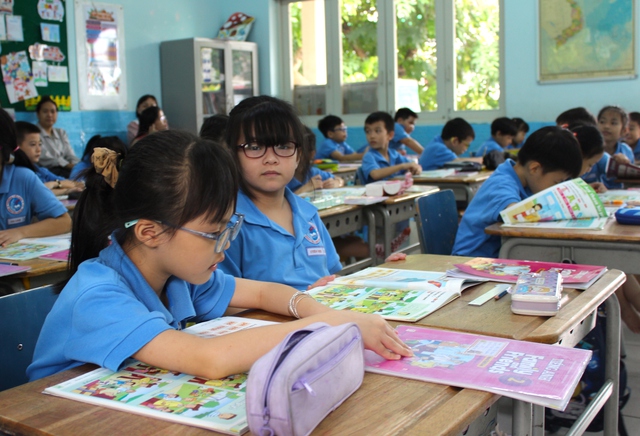Many concerns of parents were answered in the Online Consulting program of Thanh Nien Newspaper on the topic "Can I study IELTS from primary and secondary school?" taking place on the afternoon of May 6, online at thanhnien.vn , via Facebook fanpage and via YouTube and TikTok channels of Thanh Nien Newspaper.
REQUIRES A LOT OF BLACK MATTER AND CREATIVITY FROM TEACHERS
PhD student Ha Dang Nhu Quynh, Academic Director of DOL IELTS Dinh Luc, said that many primary school students have never been exposed to English before, so at the primary level, teachers must build a foundation, accumulate vocabulary, build habits, thinking, and learning methods for students. Once the foundation is "built" properly, learning will be easier later.

Guests answer questions about English learning for primary and secondary school students in an online consultation program at Thanh Nien Newspaper
PHOTO: DAO NGOC THACH
Primary school students have a different mentality from students at higher levels, so the learning method must be gentle and not stressful. "The most important thing at this level is to build in students a love of English, learning to use it, not learning to take exams or get certificates," said Ms. Nhu Quynh.
Ms. Nhu Quynh, who is also a PhD student in education at the University of Reading (UK), and graduated with a master's degree with honors, majoring in English teaching (University of Nottingham, UK), added: "The fact that students are "blank sheets of paper" seems to be a disadvantage, but in fact it is a huge advantage." According to Ms. Nhu Quynh, when not yet affected by bad learning habits or learning tricks, primary school students can be guided from the beginning with a systematic, scientific and correct method.
Ms. Nhu Quynh said that the number of students in public elementary schools is often large, so teachers can let students write down questions they still have or cut the lesson into small pieces so that students can easily absorb the knowledge... Or during the teaching process, teachers can integrate movies and music to make students interested in learning.
"Teaching young children is not easier. The knowledge taught may be simpler, but the teaching method is the challenge. How to make children interested and easily absorb new knowledge is difficult, so teachers have to invest a lot of brainpower and creativity," Ms. Nhu Quynh shared.
Can parents who are not good at English help their children learn?
Master Tran Anh Khoa, Academic Director of DOL IELTS Dinh Luc, former English major student, Le Hong Phong High School for the Gifted, Ho Chi Minh City shared: "My parents supported me and created conditions for me to learn English from a young age. My parents are not good at English, but I still achieved 9.0 IELTS. From grade 1, I was the valedictorian of the English enhancement program in a public elementary school. Currently, there are many tools to support parents and students. Even if parents are not good at English, they can still filter appropriate content for children to be exposed to English early."

Primary school students in Ho Chi Minh City during English class
PHOTO: THUY HANG
Master Do Thi Ngoc Anh, lecturer at DOL IELTS Dinh Luc, believes that parents' lack of English skills does not prevent them from helping their children learn English effectively. "For example, in the evening when the family can be together, parents only need to spend 15 - 20 minutes with their children watching an English video , or singing an English song or listening to a short story... then encourage their children with simple questions. When children are confident in speaking English, parents listen to them attentively, children will feel the care and love of their parents and have good motivation to study," Ms. Ngoc Anh advised.
LEARNING ENGLISH SHOULD BE FUN, NOT "FORCED"
In less than a month, primary school students will have summer vacation, this will be the ideal time for them to learn English. Master Tran Anh Khoa believes that in order for children to learn English effectively, they need to build a fun and comfortable journey. For example, parents should choose topics and fields that their children love to learn, such as music , movies, or choose books that their children love. "Learning English" is a general concept, quite broad and can put pressure on children. Therefore, parents should specify it with "tasks". For example, on Monday, let your children read a story in English, on Tuesday, watch an English video, on Wednesday, talk to foreigners...
Regarding study time, Master Anh Khoa believes that primary school students should not study for more than 2 hours a day. Avoid cramming, turning English into a "memorization" subject that causes pressure. The core is still to create an environment of regular contact, arousing curiosity, interest and thinking ability when learning a language.
Master Banh Pham Ngoc Van, Vietnam Market Director of the New Zealand Education Agency, Consulate General of New Zealand, cited the story of teaching English to international students in New Zealand. English communication is not only limited to the classroom but also includes activities such as learning about historical and cultural relics, talking to local people, participating in selling products to raise funds for charity...
These activities help students learn English not only in academic environments but also in real, everyday life.
Researcher Ha Dang Nhu Quynh believes that learning English is not just about imitating the pronunciation of the British or Americans. Primary school students need to be exposed to many pronunciations from many countries such as British English, American English, Indian English, Chinese English, etc.; exposed to many cultures and regions so that when they study abroad or travel, they can also communicate.
IELTS preparation for study abroad needs
Master Bang Pham Ngoc Van said that recently the demand for children to study abroad at middle and high school age is increasing, due to many benefits. International students at this age also have early preparation, such as IELTS certificates. High schools abroad such as New Zealand do not have regulations on entrance standards at each grade level when studying abroad at high school level. Thus, to know the English level of students, they need to take a test or interview with the teachers in charge. This is also quite stressful for students at this age, but if they have prepared in advance such as an international certificate, they will have a "direct ticket" to the study program that is suitable for them.
On the other hand, according to Ms. Ngoc Van, New Zealand is operating a Government Secondary School Scholarship Program (NZSS), and one of the conditions for application is to have an English proficiency equivalent to IELTS 5.0 for students in grades 8, 9 and 10.
Is learning IELTS from primary school "heavy" and "too early"?
Master Tran Anh Khoa said these are very common concerns and he partly agrees. "If teachers apply the entire IELTS program for adults to young students, it is not a wise decision. Because primary school students have different psychology and physiology, it is difficult to absorb. But if we adjust the IELTS learning materials and methods, we can teach IELTS effectively to them," said Master Anh Khoa.
Ms. Ngoc Van said that studying and taking international certification exams is like a pyramid with 3 floors, in which the bottom floor is the foundation, where students will learn English skills, learn how to think in language, vocabulary, grammar... Floor 2 is to develop, expand and improve vocabulary... Floor 3 is to practice questions. In primary school, students should study floor 1 for 80% and floor 2 should only be 20%. Thus, regardless of IELTS or any exam, you can still build real capacity and passion for English.
Source: https://thanhnien.vn/xay-nen-tieng-anh-cho-hoc-sinh-tu-tieu-hoc-18525050622332779.htm


































































































Comment (0)